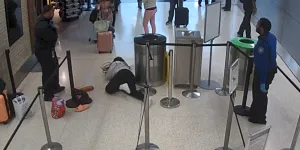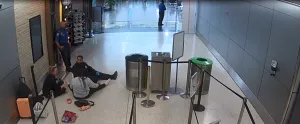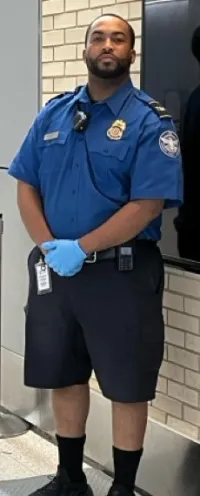 Indianapolis International Airport TSA Officer Jerald Washington contacted supervisors and assessed the threat risk. (CCTV screenshot)
Indianapolis International Airport TSA Officer Jerald Washington contacted supervisors and assessed the threat risk. (CCTV screenshot)
Fresh from a challenging encounter with a noncompliant passenger on the secure side of Checkpoint B, Indianapolis International Airport (IND) Jerald Washington walked up on another opportunity to exercise his compassionate command presence.
“I had been dealing with an intoxicated passenger which heightened my sense of awareness,” said Washington, who was rotating to the Customer Service Representative position in front of the X-ray machine when he observed a person in the queue exhibiting abnormal behavior.
“The passenger, traveling alone, began kicking, screaming and rolling around on the floor, threatening to kill herself and others,” said IND Federal Security Director Aaron Batt. “Officer Washington went to the front of the checkpoint to engage the traveler and made sure she didn’t hurt herself or others.”
“My immediate concern was for all the passengers,” added Washington. “In that moment, I just needed everyone away from me and the passenger, because at that point, I was unaware of any potential dangers.”
The passenger displayed a wide range of behaviors from angry to terrified to confused, and for a short time, even nice.
Washington’s former occupation as a corrections officer coupled with his training as a TSA officer made him exceptionally qualified to quickly assess the threat level and provide aid and safety to everyone in a highly visible and chaotic situation. He was mindful of the impact of mental health conditions and responses that trigger unexpected events.
“I have served as security in the mental health field which aided me on how to de-escalate a mental health crisis,” explained Washington. “Our TSA training indicates that we should be mindful and alert for the safety and security of all. My respect for others allowed me to be present as an officer and as a person.”
Washington notified Supervisory TSA Officer (STSO) Milane Marolf, asking her to request EMS and airport police support, and then focused on the passenger.
“Once I was able to identify that there weren’t any weapons or explosives on the body that I could see, I felt more comfortable being able to have STSO Marolf in the area,” said Washington. “In this situation, I did not want anyone else getting hurt except me, if that was needed to save others.”
Just as Washington was acutely aware of the potential danger to himself, so was Marolf. Her concerns where softened when she reached the scene and saw Washington interacting with the woman.
“When STSO Marolf arrived at my location, I believe she saw I had the situation under control,” said Washington. “She observed me using different techniques to try and gain control of the passenger who threatened to kill herself and others.”
“It was obvious he knew how to handle the distressed passenger,” said Marolf. “I offered support and was able to gain her trust as well, which I attribute to not trying to take over or force any conversation or action she was uncomfortable with.”
The passenger confided in Washington she hated police, and she suspected Marolf was law enforcement.
“I explained to the passenger that she was my supervisor who was here to help,” remembered Washington. “At this point, the passenger and I were slowly able to connect on a better level. She trusted me that Marolf could be around us during this time.”
When STSO Walter Martin arrived on the scene, he sensed the passenger wasn’t able to absorb a third stranger in the trusted circle, so he chose to back away when she became increasingly agitated with him.
“These situations can change with each individual and unique situation; it is a judgment call,” noted Washington. “Both STSO Martin and STSO Marolf were concerned for my safety as well as the passenger’s well-being.”
Throughout the eight minutes the checkpoint was closed, Washington and his colleagues sat on the ground with the woman, offered her water and helped her recover.
“I am extremely proud of Officer Washington and will forever be grateful for his presence at the right time and place,” said Marolf.
“At first, this was reported as a medical event, but the next day, after additional discussions and further investigation, it was discovered to be more,” revealed Batt. “It included an arrest and transport of the subject to a psychiatric facility for evaluation.”
The passenger appreciated Washington’s empathy and reassurance, which resulted in a positive change in her behavior.
When asked what advice he would give to people when encountering someone who shows signs of hurting themselves or someone else, Washington recommended being aware of what is happening around you and familiar with current events around the world, especially in your area.
“Signs of harm look different,” said Washington. “Be vigilant by noting your surroundings and alert others early on. These practices can be vital for a positive outcome.”
By Karen Robicheaux, TSA Strategic Communications & Public Affairs


